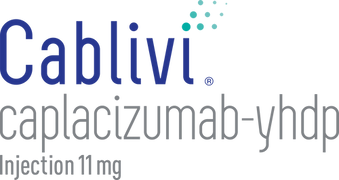Downloadable resources
For helping guide a diagnosis of acquired/immune-mediated thrombotic thrombocytopenic purpura (aTTP/iTTP)
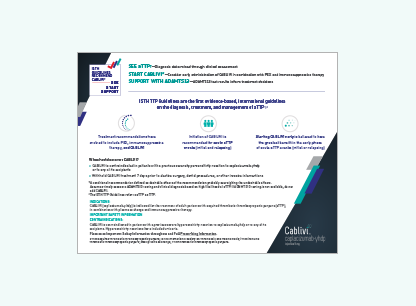
ISTH Guidelines Overview
Overview of ISTH TTP Guidelines for diagnosis and treatment with CABLIVI.
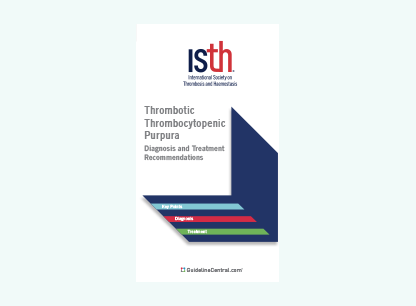
ISTH Guidelines Pocket Guide
Pocket Guide to ISTH Guidelines created by International Guidelines Center and sponsored by Sanofi.
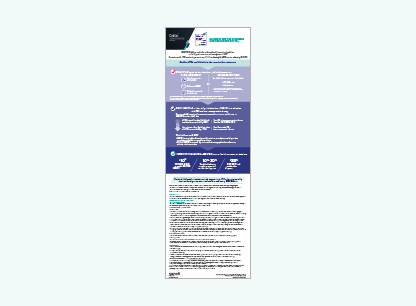
ISTH Guidelines Infographic
This graphic summarizes the key takeaways about diagnosis and CABLIVI-related recommendations in the ISTH Guidelines.
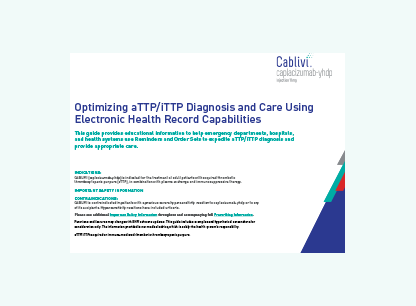
General EHR Guide
Learn more about using Reminders and Order Sets to help expedite aTTP/iTTP diagnosis and provide appropriate care.
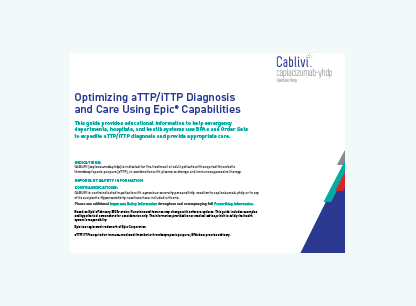
Epic® EHR Guide
Learn more about using BPAs and Order Sets to help expedite aTTP/iTTP diagnosis and provide appropriate care.
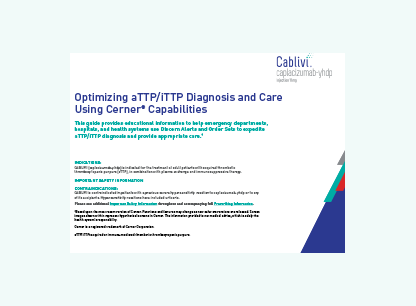
Cerner® EHR Guide
Learn more about using Discern Alerts and Order Sets to help expedite aTTP/iTTP diagnosis and provide appropriate care.
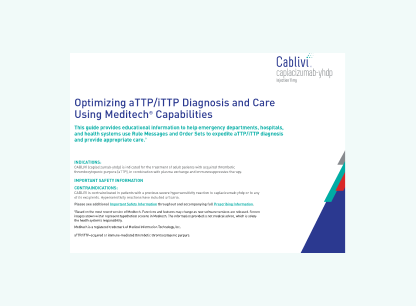
Meditech® EHR Guide
Learn more about using Rule Messages and Order Sets to help expedite aTTP/iTTP diagnosis and provide appropriate care.

Choose CABLIVI on day 1 in combination with PEX and immunosuppressive therapy

Early diagnosis of aTTP/iTTP is critical
Who should not start CABLIVI?
- CABLIVI is contraindicated in patients with a previous severe hypersensitivity reaction to caplacizumab-yhdp or to any of its excipients
- Withhold CABLIVI treatment 7 days prior to elective surgery, dental procedures, or other invasive interventions
BPA=Best Practice Alert; EHR=electronic health record; ISTH=International Society on Thrombosis and Haemostasis; PEX=plasma exchange; TTP=thrombotic thrombocytopenic purpura.
IMPORTANT SAFETY INFORMATION AND INDICATIONS
IMPORTANT SAFETY INFORMATION AND INDICATIONS
IMPORTANT SAFETY INFORMATION AND INDICATIONS
CONTRAINDICATIONS:
CABLIVI is contraindicated in patients with a previous severe hypersensitivity reaction to caplacizumab-yhdp or to any of its excipients. Hypersensitivity reactions have included urticaria.
WARNINGS AND PRECAUTIONS:
Hemorrhage:
- CABLIVI increases the risk of bleeding. In clinical studies, severe bleeding adverse reactions of epistaxis, gingival bleeding, upper gastrointestinal hemorrhage, and metrorrhagia were each reported in 1% of subjects. Overall, bleeding events occurred in approximately 58% of patients on CABLIVI versus 43% of patients on placebo.
- In the postmarketing setting cases of life-threatening and fatal bleeding were reported in patients receiving CABLIVI.
- The risk of bleeding is increased in patients with underlying coagulopathies (e.g. hemophilia, other coagulation factor deficiencies). It is also increased with concomitant use of CABLIVI with drugs affecting hemostasis and coagulation.
- Avoid concomitant use of CABLIVI with antiplatelet agents or anticoagulants. If clinically significant bleeding occurs, interrupt use of CABLIVI. Von Willebrand factor concentrate may be administered to rapidly correct hemostasis. If CABLIVI is restarted, monitor closely for signs of bleeding.
- Withhold CABLIVI for 7 days prior to elective surgery, dental procedures or other invasive interventions. If emergency surgery is needed, the use of von Willebrand factor concentrate may be considered to correct hemostasis. After the risk of surgical bleeding has resolved, and CABLIVI is resumed, monitor closely for signs of bleeding.
ADVERSE REACTIONS:
The most common adverse reactions (>15% of patients) were epistaxis (29%), headache (21%) and gingival bleeding (16%).
CONCOMITANT USE OF ANTICOAGULANTS OR ANTIPLATELET AGENTS:
Concomitant use of CABLIVI with any anticoagulant or antiplatelet agent may increase the risk of bleeding. Avoid concomitant use when possible. Assess and monitor closely for bleeding with concomitant use.
PREGNANCY:
There are no available data on CABLIVI use in pregnant women to inform a drug associated risk of major birth defects and miscarriage.
-
Fetal/neonatal adverse reactions: CABLIVI may increase the risk of bleeding in the fetus and neonate. Monitor neonates for bleeding.
-
Maternal adverse reactions: All patients receiving CABLIVI, including pregnant women, are at risk for bleeding. Pregnant women receiving CABLIVI should be carefully monitored for evidence of excessive bleeding.
INDICATIONS:
CABLIVI (caplacizumab-yhdp) is indicated for the treatment of adult patients with acquired thrombotic thrombocytopenic purpura (aTTP), in combination with plasma exchange and immunosuppressive therapy.
Please see full Prescribing Information.
Instructions For Use
Sharps Medical Waste Disposal (PDF)
Learn more about Sanofi’s commitment to fighting counterfeit drugs.
IMPORTANT SAFETY INFORMATION AND INDICATIONS
CONTRAINDICATIONS:
CABLIVI is contraindicated in patients with a previous severe hypersensitivity reaction to caplacizumab-yhdp or to any of its excipients. Hypersensitivity reactions have included urticaria.
WARNINGS AND PRECAUTIONS:
Hemorrhage:
- CABLIVI increases the risk of bleeding. In clinical studies, severe bleeding adverse reactions of epistaxis, gingival bleeding, upper gastrointestinal hemorrhage, and metrorrhagia were each reported in 1% of subjects. Overall, bleeding events occurred in approximately 58% of patients on CABLIVI versus 43% of patients on placebo.
- In the postmarketing setting cases of life-threatening and fatal bleeding were reported in patients receiving CABLIVI.
- The risk of bleeding is increased in patients with underlying coagulopathies (e.g. hemophilia, other coagulation factor deficiencies). It is also increased with concomitant use of CABLIVI with drugs affecting hemostasis and coagulation.
- Avoid concomitant use of CABLIVI with antiplatelet agents or anticoagulants. If clinically significant bleeding occurs, interrupt use of CABLIVI. Von Willebrand factor concentrate may be administered to rapidly correct hemostasis. If CABLIVI is restarted, monitor closely for signs of bleeding.
- Withhold CABLIVI for 7 days prior to elective surgery, dental procedures or other invasive interventions. If emergency surgery is needed, the use of von Willebrand factor concentrate may be considered to correct hemostasis. After the risk of surgical bleeding has resolved, and CABLIVI is resumed, monitor closely for signs of bleeding.
ADVERSE REACTIONS:
The most common adverse reactions (>15% of patients) were epistaxis (29%), headache (21%) and gingival bleeding (16%).
CONCOMITANT USE OF ANTICOAGULANTS OR ANTIPLATELET AGENTS:
Concomitant use of CABLIVI with any anticoagulant or antiplatelet agent may increase the risk of bleeding. Avoid concomitant use when possible. Assess and monitor closely for bleeding with concomitant use.
PREGNANCY:
There are no available data on CABLIVI use in pregnant women to inform a drug associated risk of major birth defects and miscarriage.
-
Fetal/neonatal adverse reactions: CABLIVI may increase the risk of bleeding in the fetus and neonate. Monitor neonates for bleeding.
-
Maternal adverse reactions: All patients receiving CABLIVI, including pregnant women, are at risk for bleeding. Pregnant women receiving CABLIVI should be carefully monitored for evidence of excessive bleeding.
INDICATIONS:
CABLIVI (caplacizumab-yhdp) is indicated for the treatment of adult patients with acquired thrombotic thrombocytopenic purpura (aTTP), in combination with plasma exchange and immunosuppressive therapy.
Please see full Prescribing Information.
Instructions For Use
Sharps Medical Waste Disposal (PDF)
Learn more about Sanofi’s commitment to fighting counterfeit drugs.
IMPORTANT SAFETY INFORMATION AND INDICATIONS
IMPORTANT SAFETY INFORMATION AND INDICATIONS
CONTRAINDICATIONS:
CABLIVI is contraindicated in patients with a previous severe hypersensitivity reaction to caplacizumab-yhdp or to any of its excipients. Hypersensitivity reactions have included urticaria.
WARNINGS AND PRECAUTIONS:
Hemorrhage:
- CABLIVI increases the risk of bleeding. In clinical studies, severe bleeding adverse reactions of epistaxis, gingival bleeding, upper gastrointestinal hemorrhage, and metrorrhagia were each reported in 1% of subjects. Overall, bleeding events occurred in approximately 58% of patients on CABLIVI versus 43% of patients on placebo.
- In the postmarketing setting cases of life-threatening and fatal bleeding were reported in patients receiving CABLIVI.
- The risk of bleeding is increased in patients with underlying coagulopathies (e.g. hemophilia, other coagulation factor deficiencies). It is also increased with concomitant use of CABLIVI with drugs affecting hemostasis and coagulation.
- Avoid concomitant use of CABLIVI with antiplatelet agents or anticoagulants. If clinically significant bleeding occurs, interrupt use of CABLIVI. Von Willebrand factor concentrate may be administered to rapidly correct hemostasis. If CABLIVI is restarted, monitor closely for signs of bleeding.
- Withhold CABLIVI for 7 days prior to elective surgery, dental procedures or other invasive interventions. If emergency surgery is needed, the use of von Willebrand factor concentrate may be considered to correct hemostasis. After the risk of surgical bleeding has resolved, and CABLIVI is resumed, monitor closely for signs of bleeding.
ADVERSE REACTIONS:
The most common adverse reactions (>15% of patients) were epistaxis (29%), headache (21%) and gingival bleeding (16%).
CONCOMITANT USE OF ANTICOAGULANTS OR ANTIPLATELET AGENTS:
Concomitant use of CABLIVI with any anticoagulant or antiplatelet agent may increase the risk of bleeding. Avoid concomitant use when possible. Assess and monitor closely for bleeding with concomitant use.
PREGNANCY:
There are no available data on CABLIVI use in pregnant women to inform a drug associated risk of major birth defects and miscarriage.
-
Fetal/neonatal adverse reactions: CABLIVI may increase the risk of bleeding in the fetus and neonate. Monitor neonates for bleeding.
-
Maternal adverse reactions: All patients receiving CABLIVI, including pregnant women, are at risk for bleeding. Pregnant women receiving CABLIVI should be carefully monitored for evidence of excessive bleeding.
INDICATIONS:
CABLIVI (caplacizumab-yhdp) is indicated for the treatment of adult patients with acquired thrombotic thrombocytopenic purpura (aTTP), in combination with plasma exchange and immunosuppressive therapy.
Please see full Prescribing Information.
Instructions For Use
Sharps Medical Waste Disposal (PDF)
Learn more about Sanofi’s commitment to fighting counterfeit drugs.
IMPORTANT SAFETY INFORMATION AND INDICATIONS
CONTRAINDICATIONS:
CABLIVI is contraindicated in patients with a previous severe hypersensitivity reaction to caplacizumab-yhdp or to any of its excipients. Hypersensitivity reactions have included urticaria.
WARNINGS AND PRECAUTIONS:
Hemorrhage:
- CABLIVI increases the risk of bleeding. In clinical studies, severe bleeding adverse reactions of epistaxis, gingival bleeding, upper gastrointestinal hemorrhage, and metrorrhagia were each reported in 1% of subjects. Overall, bleeding events occurred in approximately 58% of patients on CABLIVI versus 43% of patients on placebo.
- In the postmarketing setting cases of life-threatening and fatal bleeding were reported in patients receiving CABLIVI.
- The risk of bleeding is increased in patients with underlying coagulopathies (e.g. hemophilia, other coagulation factor deficiencies). It is also increased with concomitant use of CABLIVI with drugs affecting hemostasis and coagulation.
- Avoid concomitant use of CABLIVI with antiplatelet agents or anticoagulants. If clinically significant bleeding occurs, interrupt use of CABLIVI. Von Willebrand factor concentrate may be administered to rapidly correct hemostasis. If CABLIVI is restarted, monitor closely for signs of bleeding.
- Withhold CABLIVI for 7 days prior to elective surgery, dental procedures or other invasive interventions. If emergency surgery is needed, the use of von Willebrand factor concentrate may be considered to correct hemostasis. After the risk of surgical bleeding has resolved, and CABLIVI is resumed, monitor closely for signs of bleeding.
ADVERSE REACTIONS:
The most common adverse reactions (>15% of patients) were epistaxis (29%), headache (21%) and gingival bleeding (16%).
CONCOMITANT USE OF ANTICOAGULANTS OR ANTIPLATELET AGENTS:
Concomitant use of CABLIVI with any anticoagulant or antiplatelet agent may increase the risk of bleeding. Avoid concomitant use when possible. Assess and monitor closely for bleeding with concomitant use.
PREGNANCY:
There are no available data on CABLIVI use in pregnant women to inform a drug associated risk of major birth defects and miscarriage.
-
Fetal/neonatal adverse reactions: CABLIVI may increase the risk of bleeding in the fetus and neonate. Monitor neonates for bleeding.
-
Maternal adverse reactions: All patients receiving CABLIVI, including pregnant women, are at risk for bleeding. Pregnant women receiving CABLIVI should be carefully monitored for evidence of excessive bleeding.
INDICATIONS:
CABLIVI (caplacizumab-yhdp) is indicated for the treatment of adult patients with acquired thrombotic thrombocytopenic purpura (aTTP), in combination with plasma exchange and immunosuppressive therapy.
Please see full Prescribing Information.
Instructions For Use
Sharps Medical Waste Disposal (PDF)
Learn more about Sanofi’s commitment to fighting counterfeit drugs.
IMPORTANT SAFETY INFORMATION AND INDICATIONS
IMPORTANT SAFETY INFORMATION AND INDICATIONS
CONTRAINDICATIONS:
CABLIVI is contraindicated in patients with a previous severe hypersensitivity reaction to caplacizumab-yhdp or to any of its excipients. Hypersensitivity reactions have included urticaria.
WARNINGS AND PRECAUTIONS:
Hemorrhage:
- CABLIVI increases the risk of bleeding. In clinical studies, severe bleeding adverse reactions of epistaxis, gingival bleeding, upper gastrointestinal hemorrhage, and metrorrhagia were each reported in 1% of subjects. Overall, bleeding events occurred in approximately 58% of patients on CABLIVI versus 43% of patients on placebo.
- In the postmarketing setting cases of life-threatening and fatal bleeding were reported in patients receiving CABLIVI.
- The risk of bleeding is increased in patients with underlying coagulopathies (e.g. hemophilia, other coagulation factor deficiencies). It is also increased with concomitant use of CABLIVI with drugs affecting hemostasis and coagulation.
- Avoid concomitant use of CABLIVI with antiplatelet agents or anticoagulants. If clinically significant bleeding occurs, interrupt use of CABLIVI. Von Willebrand factor concentrate may be administered to rapidly correct hemostasis. If CABLIVI is restarted, monitor closely for signs of bleeding.
- Withhold CABLIVI for 7 days prior to elective surgery, dental procedures or other invasive interventions. If emergency surgery is needed, the use of von Willebrand factor concentrate may be considered to correct hemostasis. After the risk of surgical bleeding has resolved, and CABLIVI is resumed, monitor closely for signs of bleeding.
ADVERSE REACTIONS:
The most common adverse reactions (>15% of patients) were epistaxis (29%), headache (21%) and gingival bleeding (16%).
CONCOMITANT USE OF ANTICOAGULANTS OR ANTIPLATELET AGENTS:
Concomitant use of CABLIVI with any anticoagulant or antiplatelet agent may increase the risk of bleeding. Avoid concomitant use when possible. Assess and monitor closely for bleeding with concomitant use.
PREGNANCY:
There are no available data on CABLIVI use in pregnant women to inform a drug associated risk of major birth defects and miscarriage.
-
Fetal/neonatal adverse reactions: CABLIVI may increase the risk of bleeding in the fetus and neonate. Monitor neonates for bleeding.
-
Maternal adverse reactions: All patients receiving CABLIVI, including pregnant women, are at risk for bleeding. Pregnant women receiving CABLIVI should be carefully monitored for evidence of excessive bleeding.
INDICATIONS:
CABLIVI (caplacizumab-yhdp) is indicated for the treatment of adult patients with acquired thrombotic thrombocytopenic purpura (aTTP), in combination with plasma exchange and immunosuppressive therapy.
Please see full Prescribing Information.
Instructions For Use
Sharps Medical Waste Disposal (PDF)
Learn more about Sanofi’s commitment to fighting counterfeit drugs.
IMPORTANT SAFETY INFORMATION AND INDICATIONS
CONTRAINDICATIONS:
CABLIVI is contraindicated in patients with a previous severe hypersensitivity reaction to caplacizumab-yhdp or to any of its excipients. Hypersensitivity reactions have included urticaria.
WARNINGS AND PRECAUTIONS:
Hemorrhage:
- CABLIVI increases the risk of bleeding. In clinical studies, severe bleeding adverse reactions of epistaxis, gingival bleeding, upper gastrointestinal hemorrhage, and metrorrhagia were each reported in 1% of subjects. Overall, bleeding events occurred in approximately 58% of patients on CABLIVI versus 43% of patients on placebo.
- In the postmarketing setting cases of life-threatening and fatal bleeding were reported in patients receiving CABLIVI.
- The risk of bleeding is increased in patients with underlying coagulopathies (e.g. hemophilia, other coagulation factor deficiencies). It is also increased with concomitant use of CABLIVI with drugs affecting hemostasis and coagulation.
- Avoid concomitant use of CABLIVI with antiplatelet agents or anticoagulants. If clinically significant bleeding occurs, interrupt use of CABLIVI. Von Willebrand factor concentrate may be administered to rapidly correct hemostasis. If CABLIVI is restarted, monitor closely for signs of bleeding.
- Withhold CABLIVI for 7 days prior to elective surgery, dental procedures or other invasive interventions. If emergency surgery is needed, the use of von Willebrand factor concentrate may be considered to correct hemostasis. After the risk of surgical bleeding has resolved, and CABLIVI is resumed, monitor closely for signs of bleeding.
ADVERSE REACTIONS:
The most common adverse reactions (>15% of patients) were epistaxis (29%), headache (21%) and gingival bleeding (16%).
CONCOMITANT USE OF ANTICOAGULANTS OR ANTIPLATELET AGENTS:
Concomitant use of CABLIVI with any anticoagulant or antiplatelet agent may increase the risk of bleeding. Avoid concomitant use when possible. Assess and monitor closely for bleeding with concomitant use.
PREGNANCY:
There are no available data on CABLIVI use in pregnant women to inform a drug associated risk of major birth defects and miscarriage.
-
Fetal/neonatal adverse reactions: CABLIVI may increase the risk of bleeding in the fetus and neonate. Monitor neonates for bleeding.
-
Maternal adverse reactions: All patients receiving CABLIVI, including pregnant women, are at risk for bleeding. Pregnant women receiving CABLIVI should be carefully monitored for evidence of excessive bleeding.
INDICATIONS:
CABLIVI (caplacizumab-yhdp) is indicated for the treatment of adult patients with acquired thrombotic thrombocytopenic purpura (aTTP), in combination with plasma exchange and immunosuppressive therapy.
Please see full Prescribing Information.
Instructions For Use
Sharps Medical Waste Disposal (PDF)
Learn more about Sanofi’s commitment to fighting counterfeit drugs.
